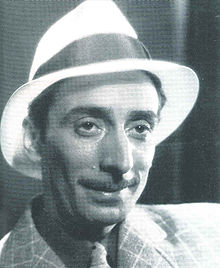Enrique Santos Discépolo
Enrique Santos Discépolo (born March 27, 1901 in Buenos Aires , † December 23, 1951 ibid) was an Argentine composer and playwright.
Life
Enrique Santos Discépolo was the youngest of five sons of an Italian immigrant family; the writer Armando Discépolo was his older brother. He was just five years old when he lost his father and nine when he lost his mother too. This loss shaped his childhood.
He wanted to become a teacher, but soon dropped out of school. Interested in the theater, Discépolo made his debut as an actor in his hometown in 1917. In addition, he began to write and compose and between 1918 and 1925 wrote some sonatas and melodies. By 1944 he wrote music and texts for more than 30 tangos, which soon became one of the most important works in the history of Tango Argentino .
Discépolo is considered one of the most famous tango composers today. His much-quoted sentence, Tango is the sad thought one can dance , went down in history.
Works (selection)
- Scripts
- Cuatro corazones . 1939.
- Fantasmas in Buenos Aires . 1942.
- Lyrics
- Cafetín de Buenos Aires . 1948.
- Cambalache 1934.
- Malevaje 1928.
- Plays
- Caramelos surtidos . 1931.
- Los duendes . 1917 (together with Mario Folco ).
- Mis canciones . 1932.
- El organito . 1925 (together with Armando Discépolo ).
literature
- José Barcia: Dicépolín . Centro de América Latina, Buenos Aires 1971 (La historia popular; 33).
- Horacio A. Ferrer: Discépolín. Poeta del hombre que this solo y espera . Editorial Sudamericana, Buenos Aires 2004, ISBN 950-07-2480-4 .
- Norberto Galasso: Discépolo y su época . Editorial Corregidor, Buenos Aires 2004, ISBN 978-950-05-0872-8 (reprint of the Buenos Aires 1973 edition).
- Dieter Reichardt: Author Lexicon Latin America . Suhrkamp, Frankfurt / M. 1992, ISBN 3-518-40485-7 , pp. 40-41.
Web links
| personal data | |
|---|---|
| SURNAME | Discépolo, Enrique Santos |
| BRIEF DESCRIPTION | Argentine composer |
| DATE OF BIRTH | March 27, 1901 |
| PLACE OF BIRTH | Buenos Aires |
| DATE OF DEATH | December 23, 1951 |
| Place of death | Buenos Aires |
